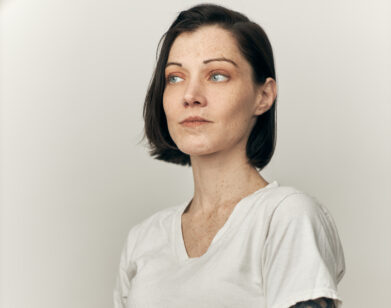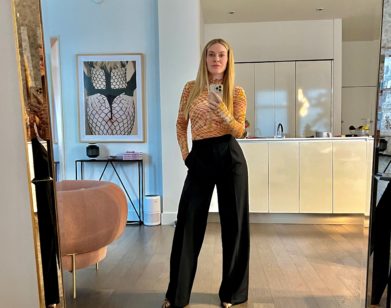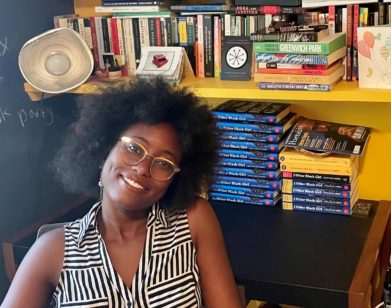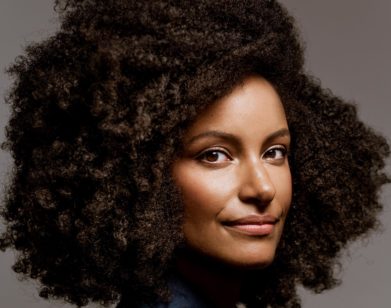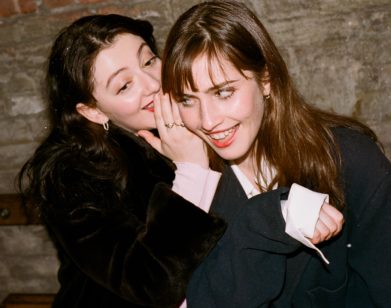LIT
“We’re Not Crazy”: Emmeline Clein, in Conversation With Cat Marnell
“Girls with eating disorders are perhaps the smartest girls around, they literally read between the lines of what everyone’s constantly telling them,” says the author Emmeline Clein, whose debut essay collection Dead Weight: Essays On Hunger And Harm, hits bookshelves today. “And unfortunately, that lesson is one that’s not going to allow us to be healthy or reach our full potential, so we need to unlearn it together.” Dead Weight offers a personal and unconventional look at disordered eating, a mental illness which kills almost as many people as opioid abuse. But that’s rarely afforded any real attention in our healthcare system or by our larger cultural establishment.
In her debut, Clein privileges the voices of women associated with eating disorders, the writings of Simone Weil, catholic saints, the saints of the 2000s Tumblrverse, and even Mischa Barton, making for a vital entry into the regrettably slim canon of ED literature. Before the book’s publication, Clein sat down with the writer and literary it-girl, Cat Marnell, resulting in a candid conversation about the harsh reality of living with an eating disorder (and the unfortunate, reductive ways books on the topic are often marketed). “There is not going to be a sad girl on it,” Clein told Marnell of her fight for a suitable cover. “There’s definitely not going to be an apple core.” Below, they talk about Ozempic, Reddit feminism, Eating Disorders Anonymous, and the legend of Reviving Ophelia.—JULIETTE JEFFERS
———
CAT MARNELL: The first thing I want to say is congratulations on your cover. Are you familiar with the book Reviving Ophelia?
EMMELINE CLEIN: Yes, I’m very familiar.
MARNELL: That was the book from my generation. In the ’90s, every mom and dad had it in their house. There’s this sad girl on the cover and the book is called Reviving Ophelia, because of course Ophelia in Hamlet jumps into the river. But, you do not have a sad girl on the cover of your eating disorder book, you have bold, graphic, neon block letters, everything I like. I would have liked this for my own book.
CLEIN: Thank you. It was definitely a journey to get to that cover, but I was like, “There is not going to be a sad girl on it. There’s definitely not going to be an apple core. We’re not going to have a strange bone font.”
MARNELL: You have to fight for the cover you want. I was told this when I worked for Lucky Magazine. My old boss Jean Godfrey-June, she had a book, a beauty editor book, called Free Gift With Purchase. And she said, “My one regret is, you have to fight for the cover you want.” Because of course, she got a perfume bottle on her cover and never liked it. I got several submissions for that sad girl cover. Simon & Schuster was taking photos of me from the internet and having a cover artist paint them. I was like, “Dude, no.” So you fought the good fight, I think this is an awesome-looking cover with wonderful endorsements from the famous Leslie Jamison. She was your professor at Columbia, right?
CLEIN: Yes, Leslie Jamison and Kate Zambreno were both my professors and I learned so much from both of them. Speaking of Ophelia, Leslie’s book Empathy Exams and Kate’s book Heroines, which is actually about to be reissued, were both really formative to my conception of that canonized doomed sad-girl narrative, and the way in which her primacy has made so many of us sick and obsessed and yearning over this very doomed figure. When, in fact, what if we looked for other models?
MARNELL: Right. How old are you?
CLEIN: I am 29.
MARNELL: When did you start writing this book?
CLEIN: I started in 2019, so that was what, five years ago now? When I first started it, I actually thought—again on the topic of Ophelia—that it was going to be about female hysteria. I wanted to do a historical study of female hysteria but also ask what it looks like in the modern age. Is it Mischa Barton? Is it Mischa Barton playing Marissa on The O.C.?
MARNELL: You love Mischa Barton.
CLEIN: I’m addicted to her. But as I started getting into the research, I realized that so many of these characters and medical case studies that I was interested in had a lot of eating disorder symptoms. Then I started reading around and realized that I couldn’t really find a book that took eating disorders seriously as a sweeping political and social and cultural and economic phenomenon in the same way that other diseases like addiction and depression, which don’t primarily affect women, are often treated in nonfiction books. I thought that might be a more generative route for me.
MARNELL: That’s a really good point. I would argue that depression gets way more attention than addiction in this country, and then eating disorders get even less attention than addiction. You’re right. Overseas, in the UK, there’s a place where I spent a lot of time where there is much more attention and treatment paid to both addiction and eating disorders. I really appreciated your in-depth writing about so many different treatment models, problematic or not. I mean, I can walk into any 12-step meeting in New York, but you know what I can’t get? Those eating disorder groups, especially after COVID. I’m in EDA—Eating Disorders Anonymous—but you do that on Zoom. The in-person meetings have all gone out the window. In the meantime, so many of us have eating disorders, right? The spiritual solution for an eating disorder is widely believed in by doctors.
CLEIN: I completely agree. So much of my project was being like, “The answer, as cringe as it is, is community.” But the way we’ve structured treatment for eating disorders, unlike in medical settings, and unlike with the 12-step model for addiction, doesn’t actually privilege communication and in fact often pits people against each other by creating a diagnostic hierarchy that makes people who are suffering from the same psychological symptoms, which may be manifesting physically in slightly different ways, feel like they’re in competition. There’s a lot of rules in treatment about what you can talk about and can’t talk about. But these feelings that are haunting you all the time, it would be incredibly cathartic to talk about them with someone else who gets it. Instead, you’re just doing things that actually reinforce the logic of your disorder, eating in a very regimented and theatrical way, and in a very specific balance.
MARNELL: Right. I’ve never done any kind of eating disorder treatment. Mainly because of the cost and the desperation, and I’m sure I represent a lot of people. When you’re googling things, whatever you find, you’re like, “I can’t afford this.” People usually come into the situation where they’re ready to surrender and heal, but you rarely have money in the bank when that happens, which is why treatment models for addiction are so much better. For alcoholics, for example, there’s essentially group therapy that’s free that you can go to every single day. But I will say, if anyone’s reading this, to go on a website like “Eating Disorders Anonymous” and Zoom in to the UK meetings.
CLEIN: The FEDUP Collective also runs a really good Zoom program. But I totally agree with you and I think the expense is completely insane. Part of that expense is that in order to get your insurance to approve treatment for an eating disorder, unlike for any other mental illness, they look at a biometric marker like your weight, so then you have to already be, as you’re saying, so severely ill in order to get considered officially anorexic, at which point recovery rates are much lower. It’s just a very straightforwardly cruel and capitalistic system where they’re only allowing you to get your treatment paid for once you’re already really sick, at which point it’s less likely to work. I talked to people whose parents ended up mortgaging homes because they were cycling in and out of these treatment centers for years.
MARNELL: You cover that with so much detail in your book, and it’s really good. I’m sitting here with you, knowing this is going to be published, and I’m speaking right now to this scariness of talking publicly about eating disorders. As a writer who is a wild party girl—”Cat Marnell, la-di-da”—I’ve had eating disorders attached to my name, but I don’t actually go into it overtly because it gets too mean. Now, you’re going to be associated with eating disorders for a long time, but if you talk about struggling with an eating disorder, you could end up like me, with a Reddit board where they’re like, “Oh, she looks like she’s doing this again.” Celebrity Memoir Book Club covered my book and they were talking about me in the craziest way like, “Can you imagine how her apartment must have smelled?” I was like, “First of all, no, that’s not what happens.” Also, I was a beauty editor–
CLEIN: “I had tons of fabulous perfumes, it smelled amazing.”
MARNELL: [Laughs] You don’t want people imagining you being bulimic. So is it hard for you?
CLEIN: It’s an incredible question. It’s incredibly frightening, for all the reasons you just laid out. People are just so unbelievably mean on the internet. I’ve seen so many women writers I admire who, as you’re saying, don’t even center the eating disorder in their narrative but mention that they’ve struggled with this. Then people on Reddit are like, “Is she body-checking in her latest Instagram? Has she been restricting?” If you’re doing that, you’re probably making a lot of things worse by weirdly posturing as the feminist police.
MARNELL: Nothing like the feminist police.
CLEIN: On Reddit, of all places. Anyway, it’s terrifying, and I worried about that. But one of the many reasons that I wanted to write this book was to demonstrate that this issue is serious, and a seminal microcosm of a lot of social and political forces that manifest in other ways in our society. I’m like, “Is it just going to be read instead as an eating disorder memoir, the way that eating disorder books have historically been siloed and understood by the literary establishment? Is the point going to get lost?” But also, “Am I going to forever be associated with a genre that I didn’t even think I was writing?” But part of the project is examining the stories that we’ve been telling about eating disorders in movies and books but also the ones that are taught in recovery. This story is that you, as an individual, were over-valuing thinness and thinking it was more important than it is—and that you have to get the eating disorder false-consciousness that’s feeding you these messages out of your mind. But that story is incredibly narrow. It doesn’t apply to most people’s eating disorders that I know or to mine. All of that is just a rambling way of saying that I am afraid that I’m going to be associated with just this one issue forever, and, in a way, that would itself be a misunderstanding of the book, which is arguing that this one issue is part of a larger set of issues.
MARNELL: That’s why I like your book, because it was so all over the place that I was like, “Good.” Because that is how you have to talk about “crazy.” It’s everywhere, it touches everything. But the big reduction that people always do is like, “Oh, this is a way for this person with the eating disorder to have some control.” My entire life I’ve been like, “You know what? Maybe I’m just addicted to the flash of dopamine that goes through my head when I lick an Oreo, and then I want more of that, just like every single person in the entire world who’s addicted to carbohydrates and sugar.” I’m addicted to junk food. It’s just that I’m not going to keep it down.
CLEIN: You’re right.
MARNELL: I hesitate to talk about it. Even in this interview, I can already feel myself wanting to pull back by saying, “People need to understand when you talk about somebody with an eating disorder that it doesn’t mean they’re necessarily active.” Eating disorders are like volcanoes, they can sit for years and not be active. They can go weeks, months, days. Most people aren’t going to tell you what’s really going on. But for me, personally, the eating disorder is in my head. It’s like a radio station, and I used to turn it off by taking amphetamines, and that turned into my drug addiction. Also, I loved your stuff about Wellbutrin in the book. I used to take a pill and my appetite would be suppressed and I would shut off my eating disorder. I could actually present and think of myself as someone who didn’t have an eating disorder for years at a time. But that doesn’t work.
CLEIN: Right, and you can do that. In treatment, they teach you to shut off the voice through these cognitive behavioral exercises or whatever. When, in fact, the only way I’ve ever found to manage the volcano for an extended period of time is by letting the voice exist and listening to it. And saying to that voice, “A lot of other people are having this same voice. You’re not crazy for having this voice. This voice is the most rational response you could have to a society that is feeding you incredibly addictive foods.” In the book, I write about all of these companies that literally have entire departments devoted to making foods explicitly addictive and looking at brain scans to attempt to activate the same receptors that opioids do. Then, of course, that sparks a binge, and binges spark a restrictive pattern. All of these coping mechanisms are us just reading the room that we’ve been locked into. It’s not that we’re misreading these smoke signals because we’re such crazy girls who can’t handle the big, scary world and need to control it.
MARNELL: For me, my eating disorder is my numb place, it’s my trance. It’s the blind spot that I’m able to disappear into. That’s where I would be fucking pounding Froot Loops, numbed out, reading celebrity gossip. So to read about it in your book is hard, because it’s so present on the page. I’m probably not the only one who’s said that.
CLEIN: You can find that take on GoodReads, for sure.
MARNELL: Welcome to the jungle, baby.
CLEIN: I was really unsure how to do it because I don’t want to intrude on someone’s sense of calm in an incredibly cruel world. But I also wanted to honestly document the experience, all the experiences we’ve been talking about, the way it touches every aspect of your life and every part of your mind and every way you interface with the world. Sometimes I’m making a joke, sometimes I’m being ironic, sometimes I’m clearly sobbing while writing, sometimes I’m maybe binging while writing. And I felt like if I tried too hard to tone it down then I would be doing a disservice to the concept of my project and to all the people that I talked to, all the internet forums that I frequented where people were so honest. Also, most of the writers that I admire who have written about any form of mental illness have been construed as overwhelming people doing too much. So I wanted to validate that you can appear to be doing too much while also making a point.
MARNELL: I guess we should address Ozempic. You go into it a little in the book. I’ve actually turned the page on that and don’t want to Ozempic-shame people. People deserve not to be tortured about wanting to lose weight. When that drug first came out, I was like, “You know what? If this really fucking makes people lose weight…” I am always of the belief that losing weight makes you insane. Any time I’ve ever lost weight, it’s at the cost of my mental health.
CLEIN: Yes, with Ozempic, I don’t want to ever shame or demonize somebody that is suffering, even if in the process they are accidentally glamorizing something. I want to do something that is neither demonizing nor glamorizing, something that is more like channeling the pain or ventriloquize-ing so that we can understand what taught these people, myself included, to believe that this was the best way to navigate systems that were designed to make us self-harm. With Ozempic, I completely understand why somebody would turn to it. But an angle I haven’t seen talked about at all is that I think that it really might trigger eating disorders like a volcano. With Ozempic, it’s not working on your metabolism, it’s just basically replicating the conditions of an eating disorder and making them possible. You’re able to eat a really small amount and you’re in contact with a doctor who is teaching you to take pride in that extreme abstention and to do all of this numerical self-surveillance. I’ve seen people on Reddit be like, “Hey, does anyone else feel like Ozempic woke their eating disorder back up?” So I’m really worried about that happening on a large scale, because they’re not really asking people if they suffer from disordered eating before they prescribe it, and most people who have eating disorders are not underweight.
MARNELL: You know why people aren’t underweight? Because eating disorders are just an endless series of fucking games. Spitting out Gushers into a Ziploc, various things to avoid swallowing food. Everyone knows Windex-ing the pizza and stuff. But it’s just endless games where you’re really just trying to take in calories in all these creative ways until it’s not going to add up to anything. But when your eating disorder’s active, you’re so obsessed with getting your food needs met that there’s no way you’re not going to hit your calorie count every day. You’re never going to have less food than other people because you’re so obsessed with it.
CLEIN: Also, evolutionarily, after every restrictive period your body thinks it was in a famine, so it’s going to make you hungrier for an extended period after that restrictive period once you break it, which is why so many people cycle between anorexia and binge-eating disorder, anorexia and bulimia. We’ve seen this since the 1950s, we just don’t care to admit it. Diets simply don’t work, because a diet is basically just a tricycle version of an eating disorder.
MARNELL: Do you have a scale in your house? I haven’t had a scale in my house or weighed myself in over six years.
CLEIN: I definitely don’t have one in my house.
MARNELL: I think what must have been frustrating for you in writing this book is that an eating disorder is so much problem and so little solution. That is what’s depressing when you go to an Eating Disorder Anonymous group. It’s a grim bunch at a fucking table. It’s sad to say, but it is. It’s so much easier not to deal with it and to go around pretending like your life is fine.
CLEIN: Completely. It’s easy to be really pessimistic, and at many points I was. And I know this sounds overly earnest, perhaps even to the point of being naive, but I find that truly talking about it honestly can be really galvanizing and liberating. Girls with eating disorders are perhaps the smartest girls around. They literally read between the lines of what everyone’s constantly telling them. And unfortunately, that lesson is one that’s not going to allow us to be healthy or reach our full potential, so we need to unlearn it together. But it’s not our fault and we’re not crazy. Every time I do an eating disorder thing and lie about it, I’m teaching my younger cousin that the way I look is obtainable not through self-harm.
MARNELL: That’s a really good point. I appreciate that, and I should probably be more open about things because it does drive me crazy. There’s one really glaring celebrity, one of the thinnest, hottest girls who’s like, “I’m just not an exercise person.”
CLEIN: There’s certainly a lot of them.
MARNELL: Well, congratulations. I’ve had a lovely time talking to you.
CLEIN: I want to really thank you, because I really deeply appreciate your honesty and willingness to talk to me about this, because it is such a fucking grim and disturbing subject and you are a woman in the public eye.
MARNELL: Also, with all due respect, anyone attacking or criticizing you for saying it’s triggering, that’s not true. I know it’s real, but we know at the same time that it’s not real. We know where eating disorders come from and it’s not from a book about eating disorders. Also, I think you’ve done Mischa Barton right. There’s not enough Mischa Barton literature in our canon.
CLEIN: Thank you so much.


